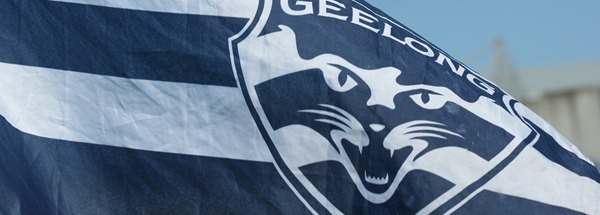One could argue the Geelong Cats have been the strongest team in the competition over the last decade, taking home three premierships in the years 2007, 2009 and 2011.
Founded in 1859, the Cats are the second oldest club in the competition after Melbourne and are also recognised as one of the oldest sporting clubs in the world. The team’s sponsorship with Ford is recognised as the longest running sponsorship of any major sporting team in the world dating back decades.

The team has always played in the hooped dark blue and white jerseys but they have not always been known as the Cats, they took on this name in 1923. Past nicknames for the team were The Pivotonians and The Seagulls. The blue on the jersey was chosen to represent the sea while the white was to represent the seagulls.
The early Geelong home games were played on a field called Argyle Square. It was located between Pakington Street and Aberdeen Street close to where the Argyle Hotel (or Irish Murphys \ Gin Palace) stands.
In 1878 they moved to their next ground in Eastern Park on Corio Oval close to where the Salvation Army’s Conference Centre is now located. By 1897 the VFL was founded and many of the Melbourne teams we know today joined the competition.
Although Geelong was successful at winning seven premierships in their earlier VFA league, the VFL premiership cup proved hard to get and it wasn’t until 1925 when they saw their first shiny trophy. They were successful again in 1931 and 1937.
In 1941 during the war time the club relocated to Kardinia Park where they remain today. The team suffered a lean patch before having back to back success in 1951 and 1952. A decade later in 1963 they won their last VFL premiership.
The late 1960’s and 1970’s proved unsuccessful for the Cats. Although they had a great run of finals appearances, they couldn’t get to that last day in September other than on unsuccessful attempt in 1967. The pain continued in the early 1980’s with coaching and team changes with no luck. In the latter half of the decade things started to change and players like Barry Stoneham, Garry Hocking, Billy Brownless, Paul Couch and Mark Bairstow started to get Geelong on a successful stream, but it was Gary Ablett who was the star of the team. He played an amazing game and the team was looking as strong as ever.
Geelong made the grand final in 1989 in what was to become one of the most legendary games of football Australia had ever seen against the Hawthorn Hawks. It was a brutal and skilful game with Geelong down by 40 points at the first siren, Geelong fought back, Hawthorn fought back, and Geelong fought back again, but Hawthorn ended up winning by 6 points after an amazing effort by Gary Ablett who was awarded the Norm Smith Medal for best on ground.
Debt and disappointment nearly brought the team to its knees in the early 1990’s but they turned around to play the 1992 Grand Final only to lose in a one sided game against the West Coast Eagles, the first interstate team to win a premiership. The rest of the nineties saw Geelong a mediocre team with 1998 being their lowest point, finishing 12th on the ladder for the season.
2001 saw them also finish 12th the year after ninth and then back to 12th for season 2003. But during this period the team had time rebuild, there was new management to bring in control the finances, new coaching and many fresh faces in the team.
2004 saw Geelong play in the pre-season grand final, losing to St Kilda, but things were slowly and steadily on the improve. In 2005 the team was unlucky to not get past the second week of the finals, loosing on the siren in an exciting game against Sydney at the SSG.
Geelong took out the 2006 pre-season NAB Cup Grand Final against Adelaide and things were starting to fall into place for the team, although the home and away season ended in disaster with Geelong finishing 10th on the board.
2007 looked to be a repeat of the disasters of 2006 with two wins and three losses by round 5, but things turned around and by the end of the season Geelong was on first place with 18 wins for the season. In the first week of the finals they took on the North Melbourne Kangaroos and beat them by 106 points. With a week off they bounced back to defeat arch rival Collingwood by 5 points and then came up against Port Adelaide at the MCG on the 29th of September and thrashed them 24:19:163 to 6:8:44. This was the first time the team brought the premiership cup home to Geelong since 1963. Geelong’s town centre swelled with people in scenes never before seen in this city.
In 2008 Geelong were back in the finals and after winning games against St Kilda and the Western Bulldogs were put up against Hawthorn in the Grand Final. Having a bad day Geelong with some very poor goal kicking lost to the Hawks 11:23:89 to 18:7:115.
Geelong were back playing on Grand Final day a year later, this time against the St Kilda Saints. After beating the Western Bulldogs and a huge win over Collingwood a week earlier, Geelong went onto bring home their second premiership in three years with a 12 point win.
In 2010 things were not as successful, the Cats had a close win against St Kilda in the first round of the finals and thrashed Fremantle by more than doubling their score, but Collingwood proved too strong for them in the Preliminary Final beating them by over 40 points. This let Collingwood into the Grand Final which they won against St Kilda.
Things turned around in 2011, with Geelong knocking Hawthorn off in the first round with 30 plus point win. West Coast were the next victims losing by nearly 50 points, then it was reigning premiers Collingwood’s turn in the Grand Final being beaten by the cats by nearly 40 points.

2012 saw a huge stand redevelopment and light towers installed at the Cat’s home ground Kardinia Park. This year though Geelong only got as far as the first week of the finals, being knocked out by Fremantle in a 16 point loss. 2013 was much more successful with a close win against Fremantle in the first week, a 16 point win against Port Adelaide in the semi-finals but a 5 point loss against Hawthorn in the Preliminary Final.
